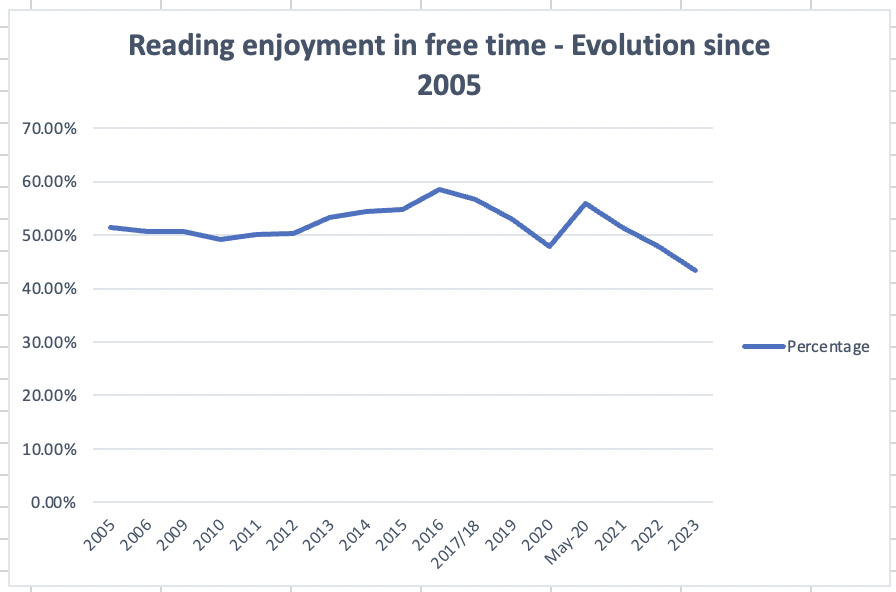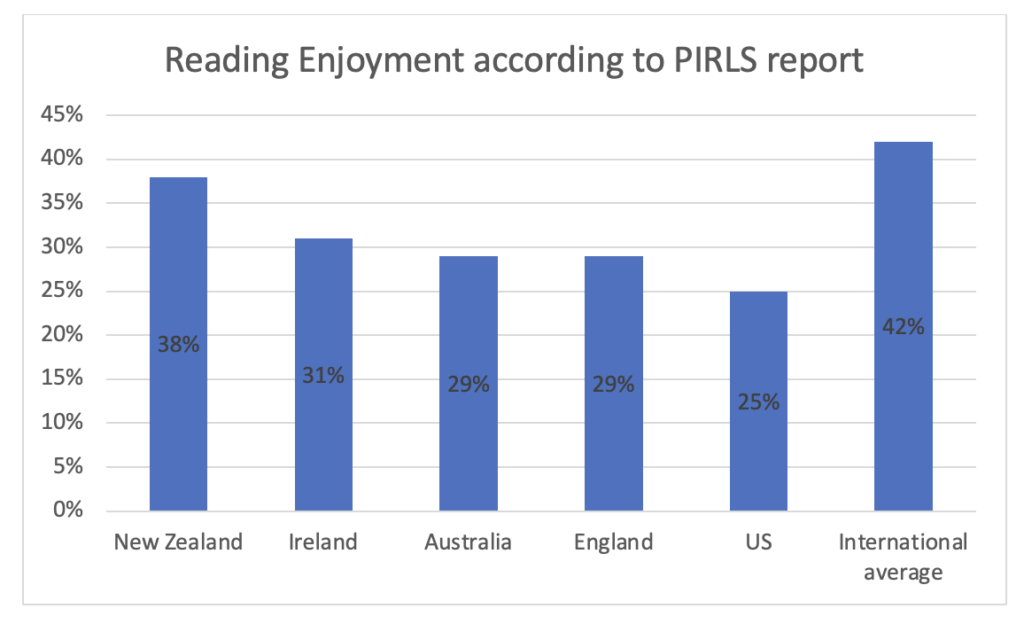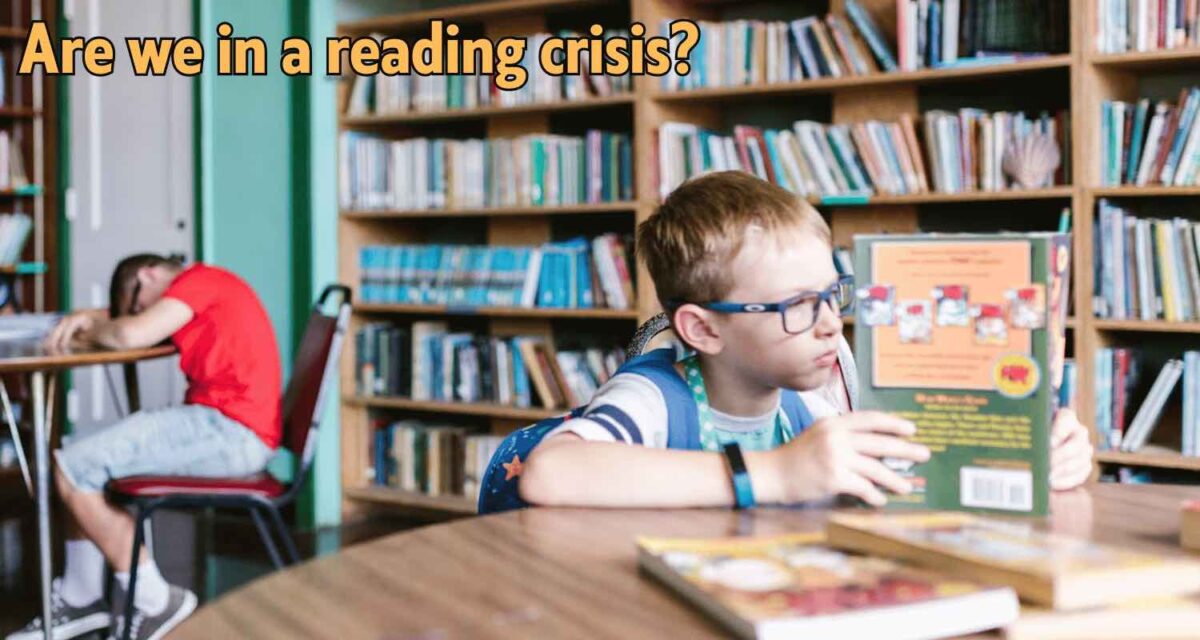Children and young people’s reading enjoyment is in a crisis, at least in the English-speaking world.
Reports show that most children do not like reading and even perceive it as boring.
This trend seems to be here to stay (and probably get worse) unless we do something about it.
While we can speculate about the causes of this crisis (and we should certainly do that) and look for solutions, I first want to present the facts so you are aware of the dimension of the problem.
Key findings about reading enjoyment in the UK (based on the report by the National Literacy Trust)
- 56% of children and young people aged 8 to 19 in the UK do not enjoy reading in their free time.
- Only 28% of children and young people aged 8 to 18 said they read daily in 2023.
- This is the lowest level of reading enjoyment recording by the National Reading Trust since they start recording in 2005.
- In 2005, 51.4% of children reported enjoying reading. The highest levels of reading enjoyment were recorded in the year 2016, with 58.6% of children saying they enjoyed reading in their free time. The lowest level of reading enjoyment, as mentioned, has been recorded in the latest 2023 report.
- The weakest levels of reading enjoyment were among children from disadvantaged backgrounds, with over 60% of children on Free School Meals saying they don’t enjoy reading in their free time.
- Fewer boys than girls enjoy reading. Plus, more girls than boys read on a daily basis. This is consistent with previous reports.

What’s the situation in the US? Reading Enjoyment in the US
There isn’t an equivalent to this report by the National Literacy Trust in the US. However, we can look at data from the latest PIRLS report, which was conducted in 2021.
The PIRLS report is an international comparative study of student performance in reading literacy and attitude towards reading at fourth grade.
- Only 25% of students in the US who participated in the study very much like reading (international average is 42%).
- 50% of US students that participated in the study somewhat like reading.
- 24% of students do not like reading.
- There was a modest relationship between liking reading and reading achievement.
- In the US, more girls than boys very much like reading (29% vs. 22%).
Other English-speaking countries also scored below the international average. See graphic below.

For more information about the PIRLS report go to: https://nces.ed.gov/surveys/pirls/pirls2021/index.asp?accordion=figure-4-acc
Why is this happening? Why is reading enjoyment at all-time low?
I do not have the answers as to why this is happening -we can only hypothesize at this point.
However, these (below) are some questions we should think about and explore, if we want to understand the real causes, which will help us look for solutions:
- Is technology really killing the love for reading? If so, should we limit its usage or could we use it to foster a love for reading – what role could ebooks, animated books and audiobooks play, in that regard? How could we make screen time more educational? What role could Generative IA play in literacy?
- Does this decrease in reading enjoyment have to do with mechanics of reading, and the fact that many children struggle?
- Does COVID have something to do with this? From more time usage in children since the pandemic (for instance, the proportion of children whose screen time was longer than 3 hours/day rose from 9.16% before the pandemic to 19.20% after the pandemic) to possible learning loss during the pandemic, which makes more children struggle with reading?
- Do children have access to a variety of books, so they can explore and discover their interests and preferences?
- Is reading on a daily basis encouraged at home? And in the school?
- Are children being read at home from an early age?
- Do parents/carers role model by reading at home?
What can parents do in the meantime to foster a love for reading?
In order to develop a positive attitude towards reading, these are some simple habits we can help our children develop at home:
- Start by reading to your child at home every day from an early age. One of the best times to make sure you are consistent and do it every day is to read before bed, which also tends to help children relax. This will help your child see reading as something natural and create the habit of reading independently in the future. Besides, this creates a bonding experience with your kid.
- Make sure your child has access to a variety of books. Apart from the books you may own, you can plan trips to the library, book swap with friends, go to second hand book fairs, etc. This will help you identify your kid’s interests and preferences when it comes to reading.
- Model at home: Reading should be seen as something natural in your home for everyone. Ideally, your child should see you reading.
- Make sure your child has some quiet time and proper space to read at home.
Sources
- National Reading Trust report: https://nlt.cdn.ngo/media/documents/Reading_trends_2023.pdf
- PIRLS:
https://pirls2021.org/results/context-student/like-reading - Screen time among school-aged children of aged 6–14: a systematic review: https://ghrp.biomedcentral.com/articles/10.1186/s41256-023-00297-z

Hey there! I’m Laura – an author, YouTuber, blogger, and the creator of the “Learning Reading Hub” platform. I created this space to dive into the world of reading instruction and to shout from the rooftops about how vital it is to use the right methods for teaching reading. I’ve got a TEYL certification (Teaching English to Young Learners), plus a Journalism degree from the University of Navarra in Spain, along with a Master’s Degree in Communication.
I’ve always loved digging into research, jotting down my thoughts, connecting with people, and sharing what makes me tick. With a background in marketing, digital projects, and the education scene (especially language learning), I’m all about wearing different hats.
When my first kid needed to learn how to read, it opened my eyes to the challenges and complexities involved. This journey took me through a rollercoaster of self-teaching, eye-opening discoveries, and yeah, some letdowns too. There’s so much conflicting info out there, along with methods that just don’t cut it. And let’s face it, these issues are way too common.
Now, I’m all about channeling that passion (without sounding like a know-it-all!) and sharing my journey. My mission? Making it easier for those who are on the same path I once was.
My heart’s with my family and the amazing Learning Reading Hub project. I live with my husband and two little ones, raising them in a bi-lingual environment (English and Spanish).

